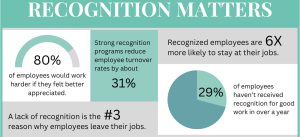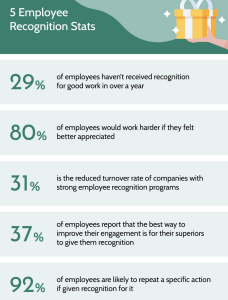It’s the one thing kids actually covet the most; it’s what most partners want from a relationship; and it’s what we also want in life too.
So why is it that ‘recognition’ – that universal need seems to get forgotten in the workplace so often?
The data certainly doesn’t lie. Recent research showed 81% of leaders said recognition isn’t a major strategic priority for them at the moment – even though the likes of Gallup have proved for years that staff who receive regular recognition are 20 times more likely to be engaged (with all the positive benefits this brings); and are 3.8 times more likely to agree that they feel strongly connected to their company’s culture.

Source: https://www.linkedin.com/pulse/all-reasons-recognition-matters-workplace-baudville/

The beauty is, recognition doesn’t even have to be something that’s big, or grand or even expensive.
As Gallup also notes, amongst employees who say they do get regular recognition, 72% say it’s the ‘small things’ that matter and which they say they commonly get recognized for.
At one organization – the earned wage access firm, ZayZoon – co-founder Tate Hackert is a convert to this.
He believes recognition should not just be a formality for organizations; it should be a transformative force used to shape the world of work.
That’s one pretty bold assertion! So what exactly does he mean by this? TLNT decided to find out:
Q: You believe recognition is a misunderstood force for good that most companies are ignoring – tell us more:
A: “For us, recognition is a way of life, and we give it meaningfully and whole-heartedly. That’s the root of how powerful it can be.
Q: So how does your recognition work?
A: “We are a 125-person organization where we all work completely remotely, and so we think recognition is just super important. I mean, who doesn’t want to be recognized? Everyday at 9am we have the whole company on a Google Meets call and as part of this, a different person will kick off with team announcements where they specifically give what we call ‘shout-outs’ to people that have either done some great work, or are really living our company values. Recognition might be for things like ‘mastery’ of a set of skills or how we can link a great piece of performance back to the things that drive our business. These things elevate and reinforce people’s importance to the business.”
Q: Are all these recognitions just verbal?
“No, we do also offer monetary ones too – such as through gift cards, for example. The point is, that the recognition is appropriate. We believe that a well-timed piece of simple recognition is much better than a grandiose, but poorly timed one. We always align recognition to our values, or some specific reason. That’s what creates buy-in. At the moment, recognition is management-driven – as it’s they who are observing people, but staff can also add messages once it’s known that a particular person is up for some sort of public recognition.”
Q: Isn’t there a danger that by ‘normalizing’ regular recognition, it ceases to be something special, and so actually loses some of its impact?
A: “There’s always this view that recognition should be reserved, and held back, so that it has more punch when it’s actually given. But here we at least try to overcome this by always saying that X-person is receiving recognition because he/she has done Y-thing that links back to our values. In other words, recognition isn’t just dished out for no reason – it has to be earned. I hear some people argue that you shouldn’t recognise people for simply doing what they’re paid to do – ie just doing their job. I agree with this up to a point. We want to recognize those who are doing something above and beyond what they’re simply being paid to do. But I accept, it’s a tough balancing act.”
Q: Can a risk of your approach be that the same small group of people get ‘all’ the recognition, and others quickly feel left out?
A: “Theoretically this is possible I suppose, but we have two shout-outs per day, and there’s always someone different leading them, so it’s more likely that everyone will get covered at some point. If people leave because they get upset about not getting recognized, we would say that says something more about them, and maybe these weren’t the right people in our organization anyway. We do accept however, that there can be rock stars in the business that may not get recognized enough. That’s for managers to take ownership of.”
Q: The question many CHROs want answered: do people prefer verbal or monetary recognition?
A: “All the research we’ve seen points to people preferring verbal recognition, but we also accept monetary recognition has a role to play too, because words can eventually fall on deaf ears. So we look at it all in the round. The one thing we’ve certainly discovered is that you can’t be everything to everyone, and so a mix of approaches tends to work better. Ultimately I think CHROs have to decide what they want their organization to stand for, and then do everything through your recognition strategies to support this, and instill it. There are no right or wrong answers.”
